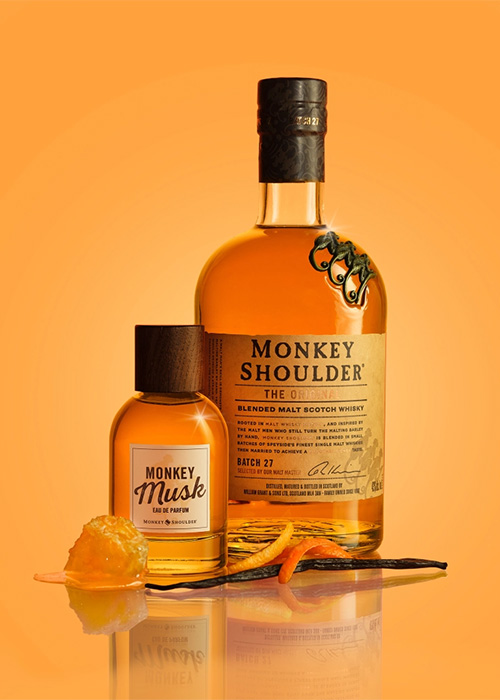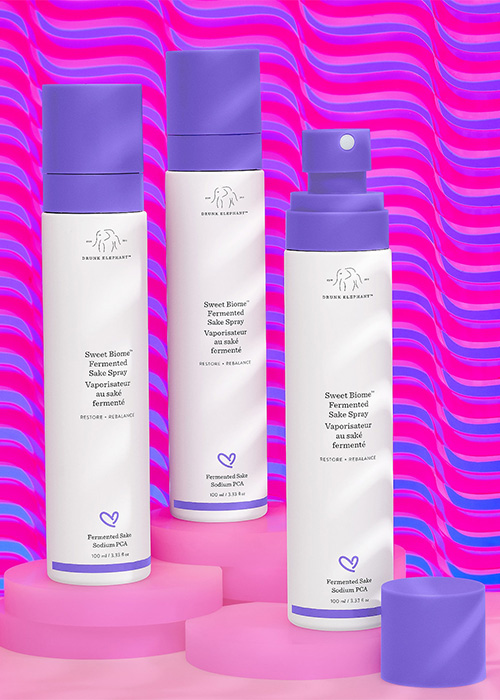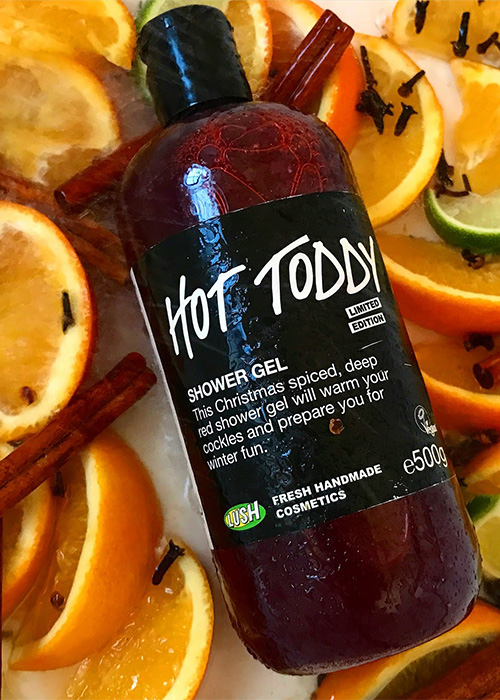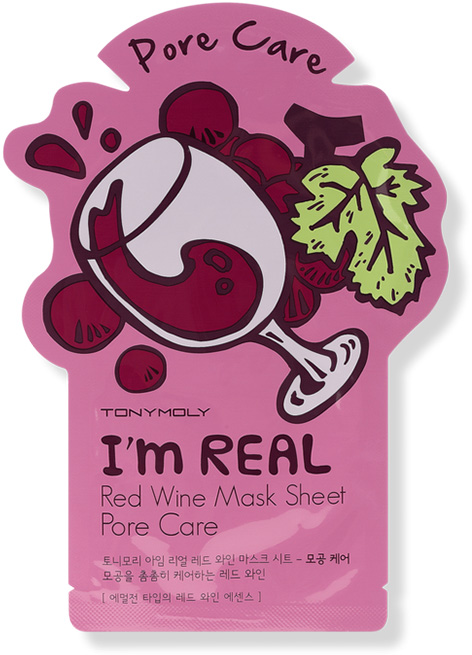Meet Monkey Musk.
It’s one of the newest innovations from whisky brand Monkey Shoulder: a fragrance that smells just like the Scotch that inspired it. As brand ambassador Anna Mains tells VinePair, the unconventional cologne features notes of orange, cardamom, and vanilla. Actor John McHale stands as the face of the product, spritzing it on a swanky suit in promotional photos for Rolling Stone.
It begs the question: Who actually wants to apply whiskey-scented aftershave as part of their morning routine, or notice the notes of the spirit on another person?
Don’t Miss A Drop
Get the latest in beer, wine, and cocktail culture sent straight to your inbox.
Turns out, a lot of people.
While “smelling like whiskey” represents one extreme end of the trend, this is not the only recent example of alcohol sneaking into beauty products. Ingredients such as red wine, sake, stout, and other drinks-adjacent items have infiltrated product lines lately. This raises another question: Patting on an alcoholic product sounds like a silly fad, but can it also benefit your skin?

Board-certified dermatologist Hadley King, M.D., says yes — but not by itself. For wine and other alcohol-inspired products, glowy skin is a team effort.
“A well-formulated product would really have just some components of wine, specifically resveratrol, combined with other ingredients we know are helpful for skin care,” she says. “Combining one antioxidant with another can help stabilize them, so that’s why you’ll often see combinations like vitamin E, vitamin C, and ferulic acid.”
As multiple online sources also attest, ingredients in common alcoholic drinks can be beneficial topically.
@naturalfacebible japanese skincare routine to fade dark spots, prevent skin aging #facemasktime #japaneseskincare #facemaskbrush #antidarkspots #antiagingskincareroutine #moisturizingmask #holisticbeauty ♬ Hrs and Hrs – Muni Long
“If you only drink sake, you’re missing out,” TikTok user @naturalfacebible instructs viewers, smoothing on a lightweight mask to her face and neck. Calling it a “Japanese beauty secret,” the user tells her nearly 350,000 followers that the rice-based drink is the best way to fade dark spots and prevent noticeable signs of aging.
This isn’t just a DIY social media hack, either. In recent years, numerous consumer products have popped up at brick-and-mortar retailers. Sephora’s shelves are stocked with Drunk Elephant’s fermented sake spray and even the personal care haven Bath and Body Works offers Old Fashioned-inspired products.
On the other end of the anatomical spectrum, curious individuals can literally dip their toes into alcohol-related skin care for a cool $83. Rice Sake Bath, from the skin care brand Fresh, offers a silky soaking experience with 38 percent real sake in its formula.
“For centuries, Japanese geisha have used sake and rice to exfoliate the face, detoxify the body, and regenerate and smooth the skin,” Fresh co-founder Alina Roytberg states in the product description. “To keep our bathing ritual authentic, we incorporated pure sake into this unbelievably detoxifying formula.”
Sure, a sake-filled bubble bath sounds nice, but are the health claims realistic?

In the beauty world, it’s fairly common to see hyped products turn out to be majorly flawed. There have been claims of irritated skin from a certain pink-hued grapefruit wash, and the unforgettably cringey era of rainbow glitter face masks. For those curious about unicorn-inspired products, glitter can cause facial irritation and typically doesn’t have any benefits beyond making you look sparkly.
Products containing ethanol or other forms of base alcohol — as well as the stuff we can actually drink — can generally be considered harsh and dehydrating for the skin, King says. “[Drinking] alcohol, as we all know, can be dehydrating because it has a diuretic effect,” she says. “Dehydration in the skin can show up as looking dull, less plump, more waxy. You can also end up with more puffiness around the eyes.”
The product list of alcohol-inspired products, however, is miles long. Here, King says, is where the real magic can happen.
Sake is created from fermented rice and brewed from koji mold. The fermentation of the Japanese alcohol produces kojic acid, which helps in evening out hyperpigmentation-related skin conditions. The enzyme-rich sake is also excellent for exfoliation and brightening, she says.
While research about wine-related skin care claims renders somewhat mixed results, King says that, “theoretically,” the antioxidants from the drink can be beneficial in minimizing damage from free radicals. Free radicals often come from UV radiation and can affect the surface of the facial skin.
“I think one of the reasons why wine gets talked about a lot in this space [is] because wine has a lot of antioxidant properties like resveratrol, quercetin, polyphenols, and flavonoids,” she says. “Our skin gets damaged from free radicals in sun exposure, pollution, and other things, so we have learned that topical antioxidants are helpful for protecting our skin from this.”
Skin-healthy ingredients aside, sometimes it really is just stellar branding that propels this viral trend.

Over at Lush Cosmetics, a chain of body and bath stores popular in the United States and U.K., alcohol serves as the key inspiration for several product selections. Similar to boozy-named products at blow dry salon DryBar, it’s a blend of what’s happening over at Monkey Musk and the healing benefits of targeted skin care products.
Lush’s Hot Toddy shower gel provides an alluring aroma that isn’t all that different from the classic cocktail. (Consistent with the product’s listed aroma notes, this shower gel smells delightfully sharp, similar to the spirit-forward drink.)
While the Hot Toddy’s intoxicating effects are in name only, the brand’s stout-infused Golden Cap Solid Conditioner also utilizes the beer’s sugar and protein content to add softness and shine.
Online, TikTok content creator @hydrationceo (real name Rachel) says she’s also noticed an uptick in buzz about alcohol-adjacent products. It’s a signal of a shifting drinks culture, she tells VinePair over email.
“I feel like more and more people are moving away from spending evenings at the bar and are opting to spend evenings at home doing a wine-infused skincare mask instead,” she says. “For people who are sober-curious, it seems like a fun way to indulge without the hangover.”
While King says some products — like luxurious red wine baths, which don’t typically absorb into the skin like targeted skin care — can be all hype without the benefits, there’s still a lot left to learn. Both the beauty and alcohol industry are still growing in tandem, as the Monkey Shoulder’s Mains tells VinePair.

“As people find the benefits of different grains on our skin in the beauty industry, you notice a lot of trends being inspired by different distillation methods,” she says. “Most master distillers have chemical engineering degrees, and it’s the same thing in the makeup and perfume industry. That is, at the heart of it: understanding the chemical makeup of what these products do, whether it’s putting them in a barrel and aging them or distilling them.”
So whether one is spritzing on a whisky-scented musk or enjoying a soothing sake mask, it’s never been easier to indulge in a luxurious alcoholic beverage — and drink one, too.